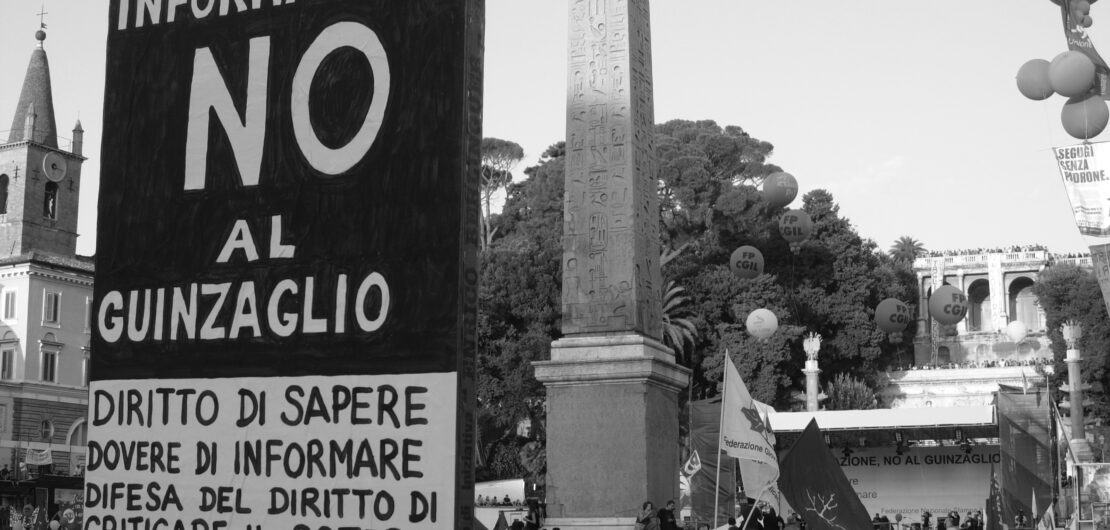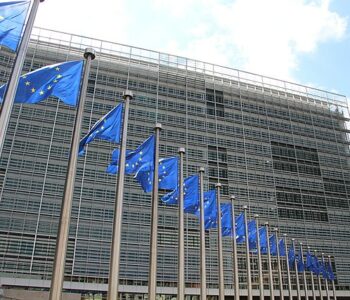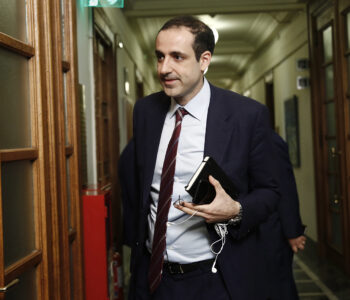 Library
Library
Silencing Voices in Italy: The Erosion of Media Freedom
Silencing Voices in Italy: The Erosion of Media Freedom
Italy’s media is in crisis, battling legal onslaughts and facing a surge of censorship one year after the establishment of the far-right government led by Giorgia Meloni.
By Sielke Kelner
This article was originally published by the Heinrich Boll Stiftung and can be accessed here.
Over the past year, Mapping Media Freedom, the monitoring tool of the Media Freedom Rapid Response, has registered 95 alerts related to Italy. For an indication of the source of these incidents it is worth mentioning some numbers: 17 physical assaults; 23 verbal attacks; 34 legal incidents; and 14 alerts related to censorship attempts. To be sure, the last two indicators are associated with the dialectics between media and the Italian government, and, although to different degrees, signal a restriction of the space for public contestation.
Accounted for within legal incidents, SLAPPs, Strategic Lawsuits Against Public Participation, pose a threat to democracy across Europe. A form of legal harassment against critical voices, SLAPPs are pursued by powerful individuals, including politicians, who seek to avoid public scrutiny, inhibiting debates on matters of public interest. The very notion of public interest defines SLAPPs. We arguably have a SLAPP when the legal dispute concerns the content of an article related to issues such as politics, social welfare, education, health issues, climate, or the environment. We do not have a SLAPP if the content is related to the private life of an individual, provided that these details do not have a consequence on the public interest. SLAPPs’ final goal is not winning the lawsuit, but to economically and psychologically drain the defendant and reduce them to silence. Eventually, SLAPPs trigger a ‘chilling effect’ on the rest of the community, convincing others to give up their right to public participation.
In Italy, the overwhelming majority of vexatious lawsuits are enabled by defamation provisions, which can take the shape of civil or criminal lawsuits. Italian politicians have a long-standing tradition of resorting to defamation provisions in order to silence critical voices. Among the highest-profile public figures who responded to investigative journalism and satirical illustrations with manifestly underfunded or exaggerated lawsuits: in 1988, PM Christian Democrat Ciriaco De Mita sued director of newspaper l’Unità Massimo D’Alema over the title of an article; in 1999, when Massimo D’Alema became PM himself, leading a social-democratic coalition, he sued Giorgio Forattini for a satirical illustration; fast forward to 2009, liberal conservative PM Silvio Berlusconi sued Italian outlet La Repubblica for an article. Over the decades, resorting to vexatious lawsuits has been practiced across the aisle.
However, throughout the past year, the number of legal intimidations initiated by public figures and targeting critics of the government has been increasing steeply. The following list is representative of what has become an ordinary abuse of Italian defamation provisions, or the threat to resort to them, at the hands of members of the current cabinet.
In October 2022, Defence minister Guido Crosetto announced that he had instructed a law firm to take legal action against the newspaper Domani over an article examining a potential conflict of interest related to his links to the arms industry.
In November 2022, the public prosecutor decided to open a criminal defamation trial following a lawsuit against Domani initiated by the current PM then leader of the opposition Giorgia Meloni in 2021. The legal action stemmed from an article that raised concerns about a controversial procurement process of face masks during the initial phases of the COVID-19 pandemic.
At the beginning of March 2023, Domani’s newsroom learned that Claudio Durigon, Undersecretary at the Ministry of Labour and Social Affairs, had initiated legal proceedings against them when two police officers handed them a seizure order directed at one of Domani’s articles. Authored by investigative journalists Giovanni Tizian and Nello Trocchia, the article examined the alleged links between Durigon and members of local criminal organizations in Latina, south of Rome. The seizure order triggered an international response by freedom of expression organizations, Italian and European trade unions, as well as MEPs, followed by an awkward order of release of the article signed by Rome’s prosecutor. The lawsuit was recently dismissed by Rome’s judge of preliminary investigations.
At the end of May, Adolfo Urso, Minister of Enterprises and Made in Italy and member of Fratelli d’Italia party, announced he will take legal action against RAI’s investigative program Report following alleged “blatant falsehoods made with clear defamatory intent” contained in the broadcast.
At the beginning of June, Lega leader and current minister of Infrastructures Matteo Salvini announced that he had instructed his lawyers to file a complaint against L’Espresso for their 2019 report about the so-called Metropol case, which revealed alleged connections between Lega and the Kremlin.
A few days later, Minister of Tourism and member of Fratelli d’Italia party Daniela Santanché announced she had given her lawyers the mandate to file a defamation lawsuit against RAI’s investigative program Report due to its recent critical reporting on the minister’s business ventures.
At the beginning of August, Arianna Meloni, wife of Minister of Agriculture Francesco Lollobrigida and sister of the prime minister Giorgia Meloni, currently secretary of the political section of leading coalition party Fratelli d’Italia, filed a lawsuit against satirical illustrator Mario Natangelo in relation to a caricature.
Last September, Giancarlo Giorgetti, current minister of the Economy, has announced that he instructed his lawyers to file a lawsuit against daily newspaper Domani for an article authored by investigative journalist Giovanni Tizian. In the quoted piece, Tizian had examined links between business ventures and government contracts granted to Francesca Verdini, partner of Matteo Salvini.
At the beginning of October, Ignazio La Russa, president of the Senate and member of Fratelli d’Italia, announced a criminal defamation complaint against RAI show Report. The announcement was made one day prior to the show screening an episode dedicated to La Russa’s family alleged business ventures. In the meantime, Report’s presenter, Sigfrido Ranucci, was summoned by RAI Director’s Supervisory Committee, a further manifestation of political pressure. The summon was not only unusual, given that individual journalists have never been audited by the Committee before; member of the ruling coalition have taken the chance to publicly mock Ranucci during the meeting.
A few days later, Italian writer and journalist Roberto Saviano was found guilty of criminal defamation by the Criminal Court of Rome. The case was instigated by Giorgia Meloni in November 2021, before she took on her current position as Prime Minister. The criminal lawsuit charged Saviano with aggravated criminal defamation because of his outspoken criticisms regarding Meloni’s unwavering anti-migrant position.
Finally, last December, the third hearing in the criminal defamation trial initiated by current minister of Transportation Matteo Salvini against Roberto Saviano was postponed for the second time by the judge due to Salvini’s non-appearance. In a social media post, Saviano had called the Lega leader “minister of the underworld”, echoing an essay by Italian journalist and historian Gaetano Salvemini.
What do Sigfrido Ranucci, Roberto Saviano, Mario Natangelo, Giovanni Tizian and Nello Trocchia have in common? In their different capacities, they are critics of high-profile figures of the current government. The latter ones seem oblivious of the European Court of Human Rights jurisprudence, which has clarified that public figures, especially those in political roles, should tolerate a higher degree of criticism and scrutiny due to their prominent position in society. Yet, the legal cases listed above are a reminder that freedom of expression is a right that cannot be taken for granted, and it is central not only to media practitioners, but to the society as a whole. The role of journalists as public watchdogs lays at the heart of the participation of the society in public affairs. And the degree of freedom accorded to political debate and criticism constitutes the very essence of democratic societies.
This alarming trend has been accompanied by a problematic bill put forward by the ruling coalition which aims at reforming defamation. Currently being discussed by the Justice Commission of the Italian Senate, the bill advances provisions directed at increasing the fines for criminal defamation up to 50,000 euros and introduces disciplinary penalties intended to disqualify journalists from practising the profession for a period of up to six months Similarly, the introduction of automatic rectifications without the chance for the editor to add a title, comment or reply risks compressing the space for press freedom. Such provisions represent a serious source of concern for Italian civil society and collide with the interpretation of the right to freedom of expression provided by the European Court of Human Rights. They risk triggering a chilling effect on freedom of the press and expression.
More recently, the Costa bill emerged as one more example of Italian decision makers’ attempt to control media reporting. Approved by the lower chamber of the Parliament before the Winter break, the amendment forbids transcripts’ publications of pre-trial detention orders until the end of the preliminary investigations, severely restricting court reporting. In a national context characterized by a sizable phenomenon of collusion between politics and criminal organizations, the Costa amendment poses a threat to citizens’ right to be informed.
Another critical episode which has been shaping the relation between media and the Meloni government pertains to the interreference of the executive in the governance of the public broadcasting service. To be sure, the independence of RAI, Radiotelevisione italiana, the Italian national public broadcasting company, is a traditionally sensitive topic which periodically surfaces on Italian political agenda, its funding and governance being subjected to political interference. The 2023 Media Pluralism Monitor, placed Italy among the countries in which the independence of public service media is most threatened, RAI’s governance and funding being both subjected to political interference. Last Spring, the current cabinet operated significant internal management changes which led to the resignation of the public broadcaster CEO. On that occasion, international media freedom groups raised alarm about Italian public service broadcaster’s independence. Such political appointment set a worrisome precedent for two reasons. Firstly, RAI CEO resigned one year prior to his term conclusion citing political pressure, just few weeks before the yearly expiration of a number of RAI’s tv show contracts. Secondly, the newly appointed CEO, Roberto Sergio, swiftly invoked “a new storytelling”, arguably in line with the ruling coalition’s agenda, which had immediate consequences on RAI’s programming. The timing resulted in a flood of well-established shows migrating to private broadcasting companies, such as the celebrated show Che Tempo Che Fa led by Italian journalist Fabio Fazio. Similarly, the case of Roberto Saviano’s anti-mafia show, Insider, which had been already recorded and cancelled abruptly caused international resentment. What both Fazio and Saviano have in common, alongside with other professionals who left RAI over the past few months, is their criticism, subtle or vocal, toward members of the current cabinet.
Six months later, tv shows introduced by the new RAI management, aligned to an agenda which favored political interests over the public one, have shown their limits, audience shares having dropped significantly. Additionally, Giorgia Meloni’s coalition partner, Lega’s leader Matteo Salvini has succeeded in shrinking the funding allocation to the broadcasting service, a provision which was introduced into the recently approved Budget Law. A condition which further threatens RAI’s financial autonomy.
The use of SLAPPs by public figures, attempts to control court reporting, and political interference in the public broadcasting service, are part of a broader contraction of the space for public contestation in Italy. A trend which cannot be dissociated from other worrying endeavors of the current Government to restrict the civic space, such as the criminalization of climate dissent. It is not by chance that such factors are accounted for in the assessment of the European Commission’s Rule of Law mechanism. Francesca De Benedetti, Domani’s journalist who leads the European affairs department, indicates vexatious lawsuits and political interreference as deterioration signals of the rule of law in Italy. She draws the attention on a further alarming conduct of the ruling party, “the PM’s unwillingness or irritation at having to respond to questions from journalists, who are sometimes accused of going against the country if they ask her about some ongoing scandal.” According to De Benedetti, “Of all the attacks on the rule of law, attacks on the media and judges are among the most insidious, because it means attacking the sentinels of democracy, with knock-on effects in all areas”.
The distress signals sent by Italian journalists, local stakeholders, and trade unions as well as international media freedom organizations are to be taken seriously. Academic evidence has proved that amid the ongoing trend of autocratization, electoral systems and procedures usually stand strong. It’s media freedom, the right to express oneself, access to alternative information sources, that are facing erosion. While V-Dem Institute 2023 Democracy Report shows how in the past ten years autocratization processes (i.e. denoting the decline of democratic qualities) have been mushrooming globally, its authors argue that media freedom and freedom of expression have been dramatically impacted by these dynamics. To be sure, the report highlights how attacks on media and contraction of the freedom of expression are the first targets of “wanna-be dictators”.
Intolerance to criticism pertaining political conduct and political interference in the public broadcasting service both signal a disquieting trend of Italian leadership which fails to take into consideration the public interest. It also constitutes an early warning of the erosion of one of the most important democratic features, media freedom and freedom of expression. Falling short on criticism acceptance is a tendency which is reminiscent of what Umberto Eco, during a lesson delivered at Columbia University in the 1990s, identified as a feature of Ur-Fascism. According to Eco, “In modern culture the scientific community praises disagreement as a way to improve knowledge. For Ur-Fascism, disagreement is treason”.











